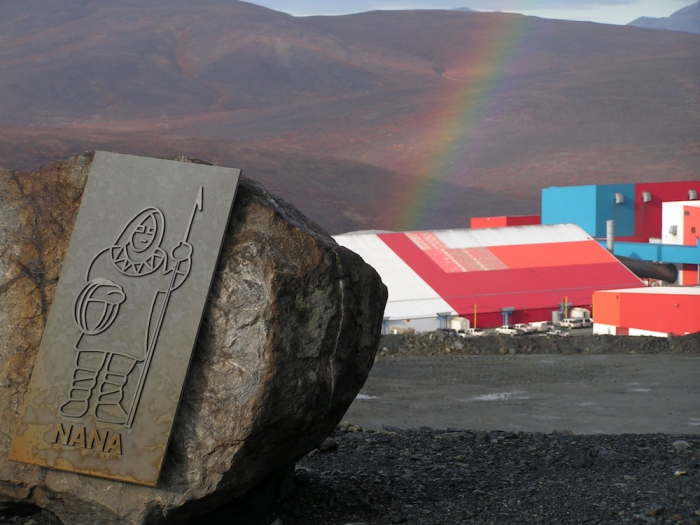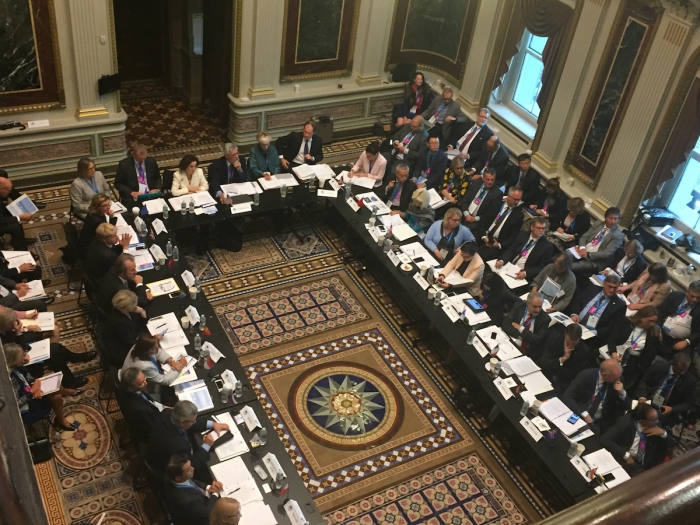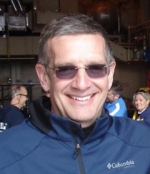By: John Farrell, Executive Director, U.S. Arctic Research Commission
Commission meeting. The 110th public meeting of the USARC will be held 5-7 September in northwestern Alaska. Input from this meeting will help inform the USARC's recommendations to the President and Congress on Arctic research. Commissioners, staff, and invited guests will meet publicly in the Northwest Arctic Borough Assembly chambers in Kotzebue on 5 September. The day-long gathering will start with a semi-structured discussion with local residents directly involved in research. This will be followed by in-depth presentations on the topics of health and community wellness, infrastructure and adaptation, and on scientific research projects currently being conducted in the region. A detailed agenda, including speakers and topics, is available on the USARC website. On 6 September, the Commission will visit the villages of Selawik (population ~830) and Buckland (population ~430) to compare and contrast the water and sanitation services and related infrastructure. The USARC encourages applied research on these topics and helps facilitate the [Alaska Rural Water and Sanitation Working Group]
( https://www.arctic.gov/water-san/index.html) that is advancing research to maximize the health benefits of in-home running water and sanitation services in rural Alaska. On 7 September, to better understand the importance of research associated with natural resources, the Commission will conduct a site visit to the Red Dog Mine, the world's second largest source of zinc ore.

Second Arctic Science Ministerial. Given the success of the inaugural [Arctic Science Ministerial](https://www.arctic.gov/publications/other/supporting_arctic_science.html, organized and hosted by the United States in September 2016, at the White House, a second ministerial has been scheduled for 26 October 2018, in Berlin, Germany. The organizers of this effort are the European Union, Germany, and Finland. The ministerial will be preceded on the 25th by an Arctic Science Forum that will involve 10-12 scientists from each participating country, as well as five representatives from each of six Indigenous peoples groups, and one representative each from about 10 other international organizations. The ministerial will have three themes: (1) Strengthening, integrating and sustaining Arctic observations, facilitating access to Arctic data and sharing Arctic research infrastructure; (2) Understanding regional and global dynamics of Arctic change; and (3) Assessing vulnerability and building resilience of Arctic environments and societies. The US delegation to the ministerial will be headed by Dr. France Cordova, the NSF Director. She will be joined by Dr. Tim Gallaudet, Acting Administrator of NOAA, and the Honorable Fran Ulmer, Chair of the USARC. As with the first ministerial, the main outcome from the second ministerial will be a "Joint Statement of Ministers," the drafting of which has been in progress for months.

USARC's "Report on the Goals and Objectives for Arctic Research 2019-2020." As required by law (the Arctic Research and Policy Act of 1984), one of USARC's primary duties is a biennial report to the President and Congress. The Commission will release this report in January 2019. The content of the report is collected from public meetings, and sought from scientific researchers, policymakers, and the general public in Alaska, throughout the United States, and in a growing number of nations with Arctic interests. The report will contain five major goals: (1) Observe, understand, and forecast environmental change; (2) Community health and wellbeing; (3) Advance Arctic infrastructure; (4) Assess Arctic natural resources; and (5) "Enhance international scientific cooperation in the Arctic. The report will refer to White House guidance on science and technology (specifically the fiscal year 2019 and 2020 "Administration Research and Development Budget Priorities" here: https://www.whitehouse.gov/ostp/documents-and-reports/), strengthen links to the 2017-2021 Interagency Arctic Research Policy Committee Arctic Research Plan (here: https://www.iarpccollaborations.org/plan/index.html), and will identify emerging topics in Arctic research.
 John Farrell is the Executive Director of the U.S. Arctic Research Commission, an independent federal agency of Presidential appointees that advises the White House and Congress on Arctic research matters and works with executive branch agencies to establish and execute a national Arctic research plan. The Commission also facilitates cooperation with local and state governments and recommends means for developing international scientific cooperation in the Arctic.
John Farrell is the Executive Director of the U.S. Arctic Research Commission, an independent federal agency of Presidential appointees that advises the White House and Congress on Arctic research matters and works with executive branch agencies to establish and execute a national Arctic research plan. The Commission also facilitates cooperation with local and state governments and recommends means for developing international scientific cooperation in the Arctic.
